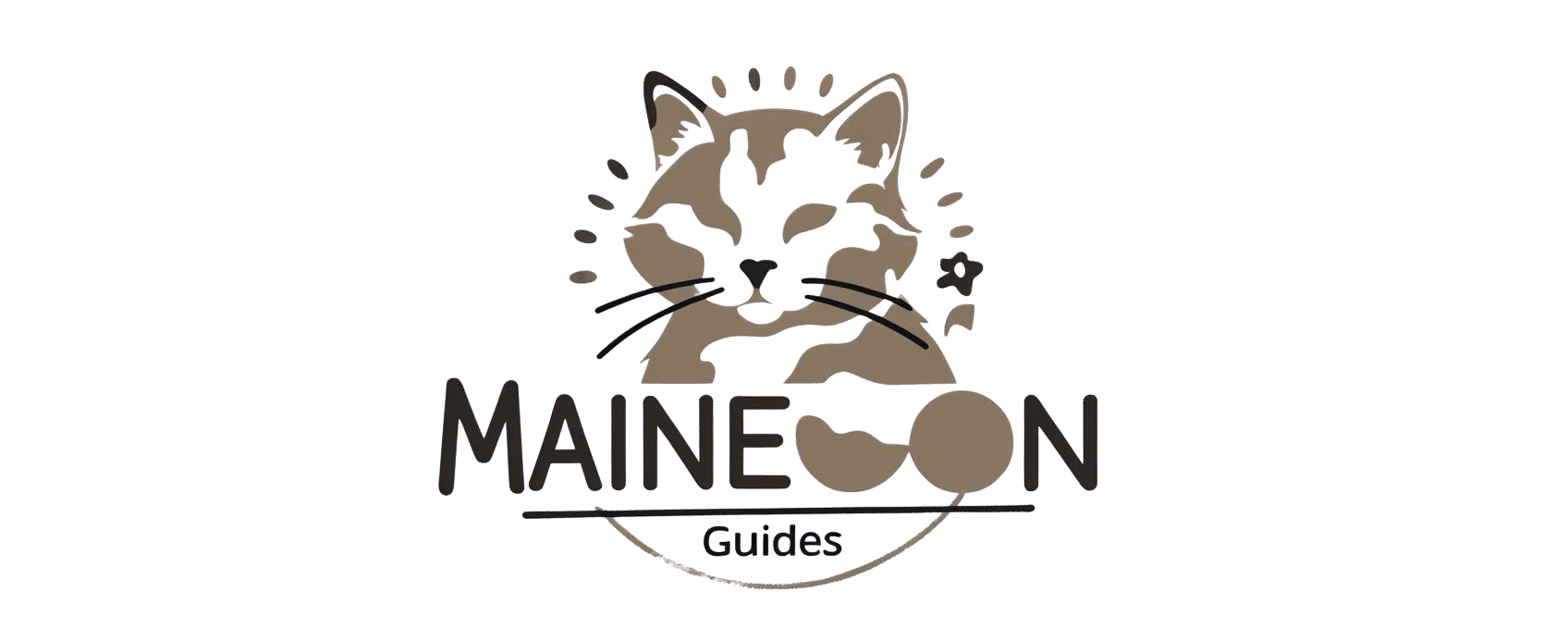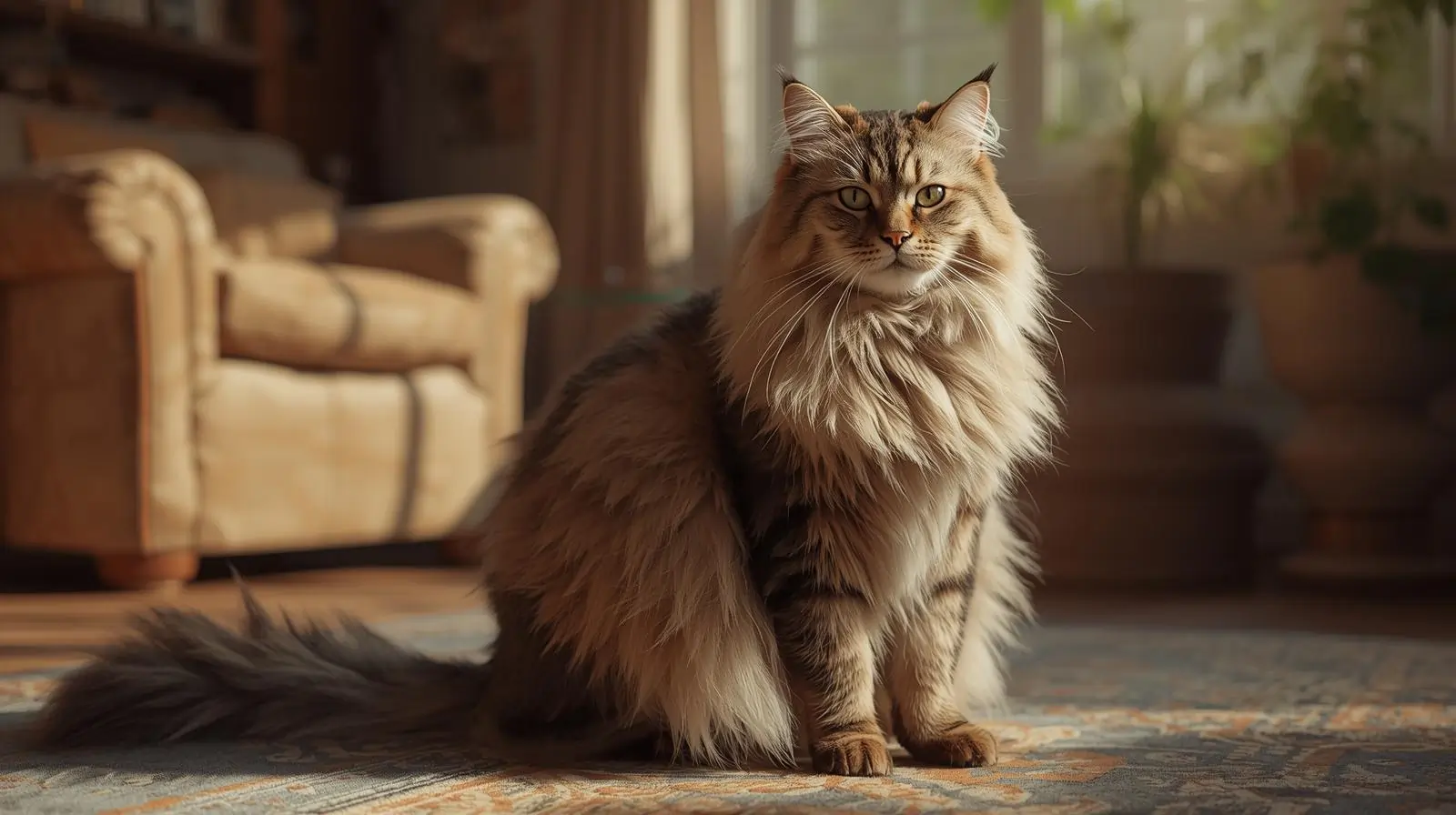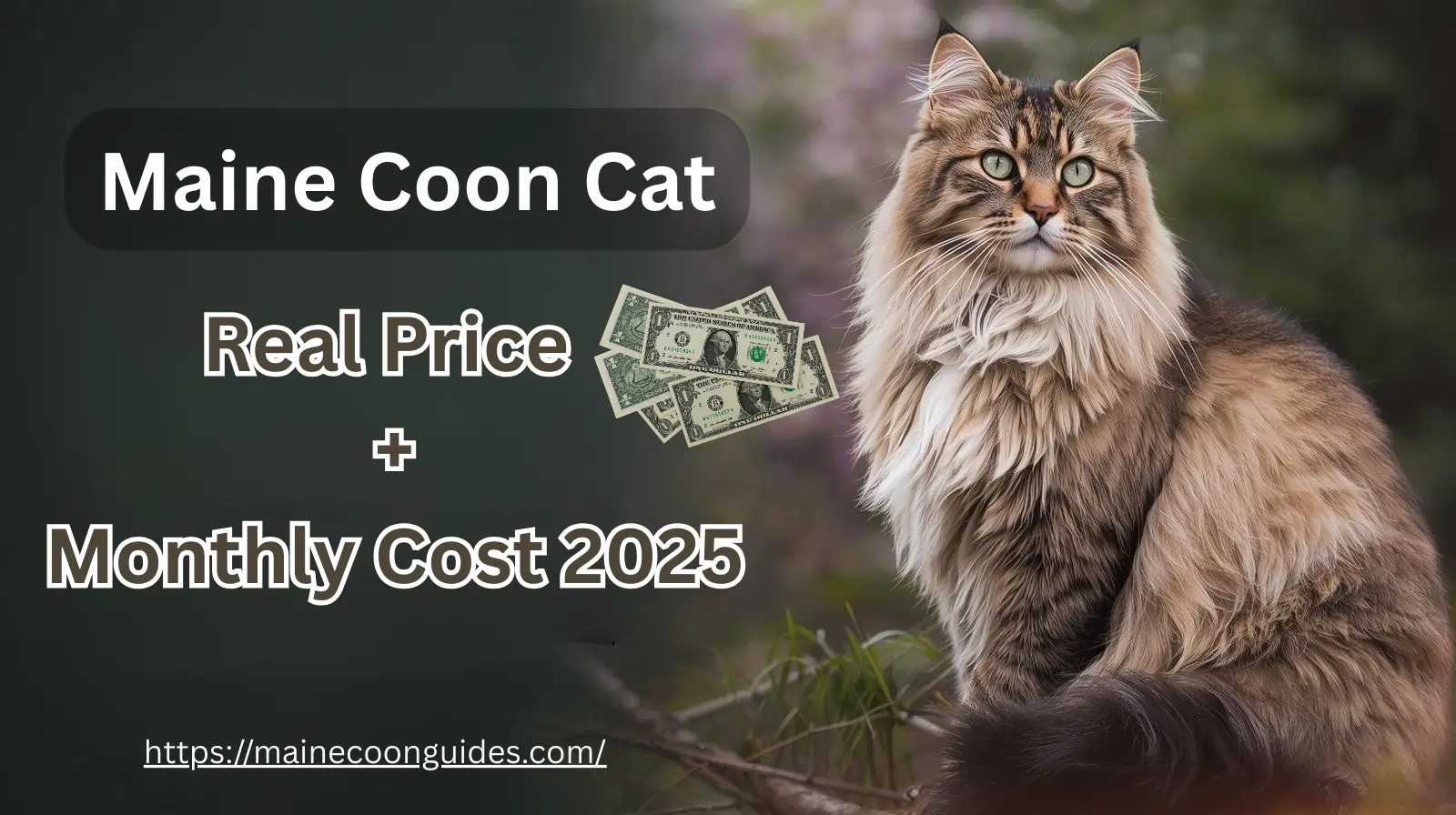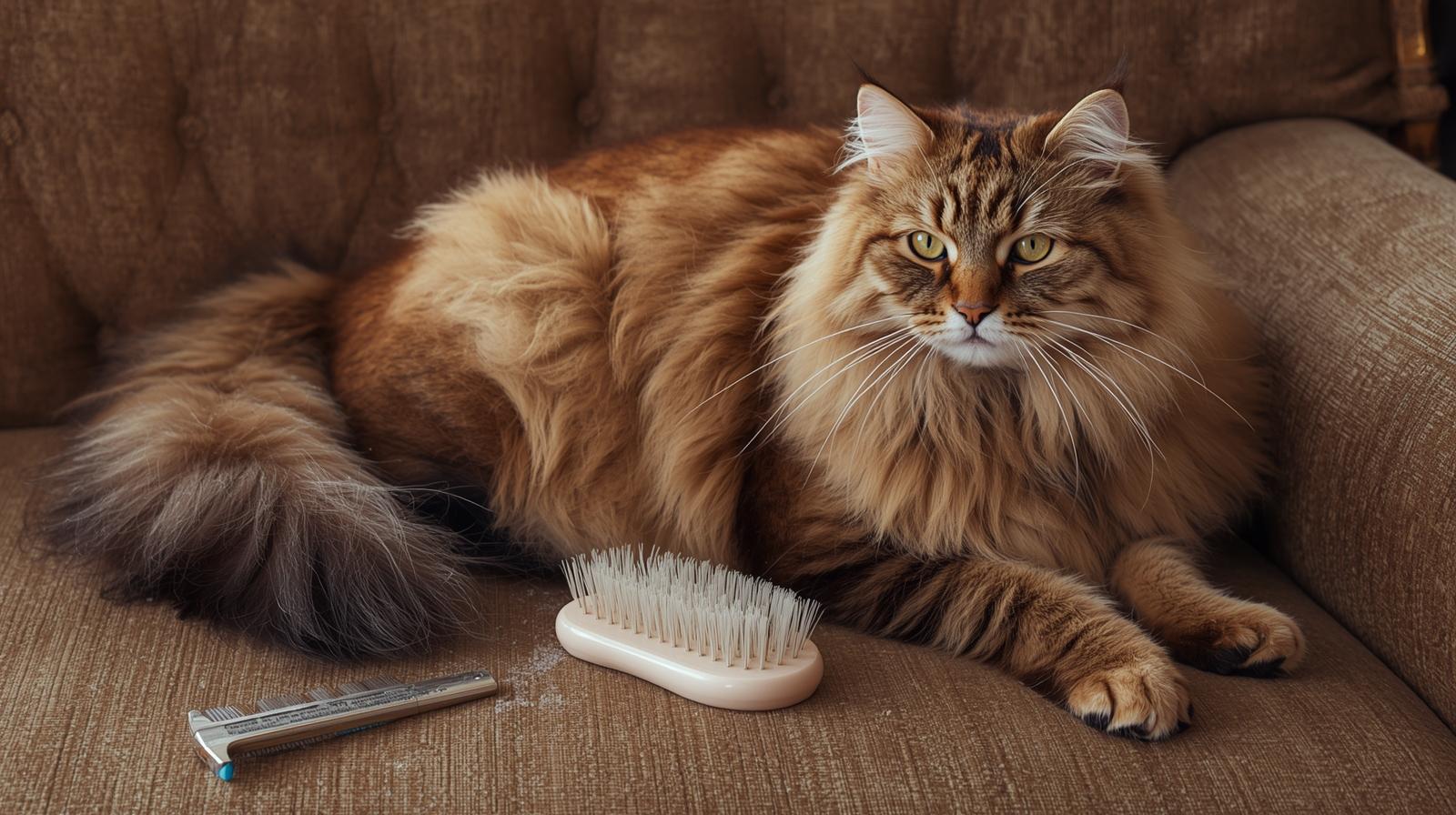Orange Maine Coon Cat: Complete Guide with Stats & Facts
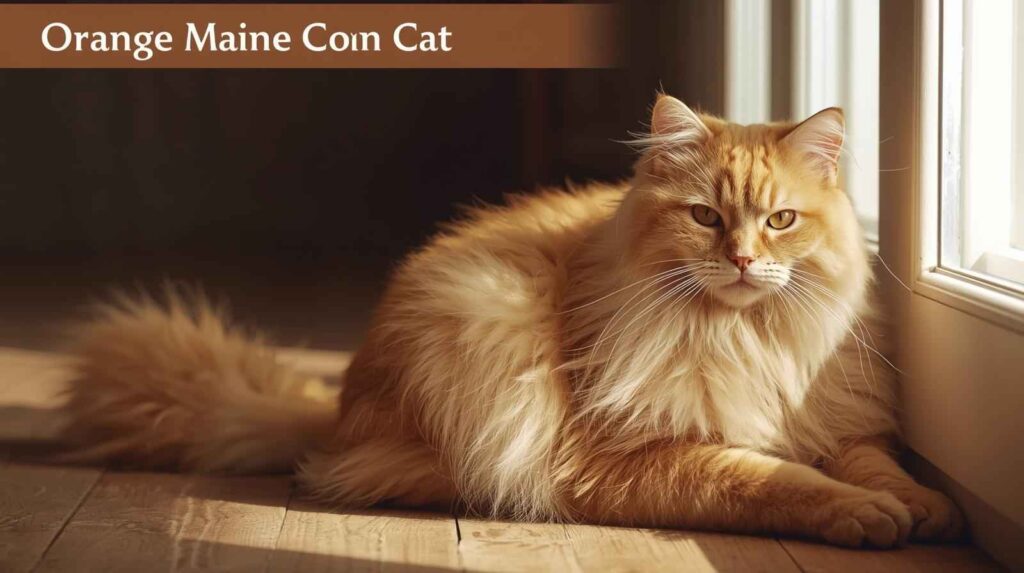
The orange Maine coon cat stands as one of the most magnificent and sought-after color variations of America’s beloved gentle giant breed. These stunning felines combine the impressive physical characteristics of traditional Maine coons with the warm, vibrant coat coloration that makes them truly exceptional companions.
Understanding the Orange Maine Coon Cat Genetics
The genetics behind an orange Maine coon cat are fascinating and contribute to some interesting breed characteristics. The orange coloration in Maine coons is linked to the ‘O’ gene, which always expresses itself with a tabby pattern, and due to genetic requirements, up to 80% of all orange Maine coon cats are male. This genetic predisposition makes male orange Maine coon cats significantly more common than their female counterparts.
Maine coon cat inherits its stunning coat through X-linked inheritance patterns. Since males only need one copy of the orange gene to display the coloration, while females require two copies, this explains the dramatic gender distribution. This genetic phenomenon means that finding a female orange Maine coon cat is considerably rarer and often more expensive.
Physical Characteristics and Size Statistics
Maine coon shares the impressive size characteristics that make Maine coons famous worldwide. On average, males weigh from 18 to 22 pounds (8.2 to 10.0 kg), with females weighing from 12 to 15 pounds (5.4 to 6.8 kg). However, some exceptional orange Maine coon cat specimens can reach even more impressive weights.
Size Comparison Table
| Gender | Average Weight | Length | Height at Shoulder |
|---|---|---|---|
| Male Orange Maine Coon | 18–22 lbs | 30–40 inches | 10–16 inches |
| Female Orange Maine Coon | 12–15 lbs | 30–40 inches | 8–14 inches |
Maine coons are unique in that they don’t stop growing until they are 4-5 years old, with males generally weighing 15 to 25 pounds and females 10 to 15 pounds. This extended growth period means your orange Maine coon cat will continue developing well into adulthood, making proper nutrition crucial during these formative years.
Orange Maine Coon Cat Personality Traits
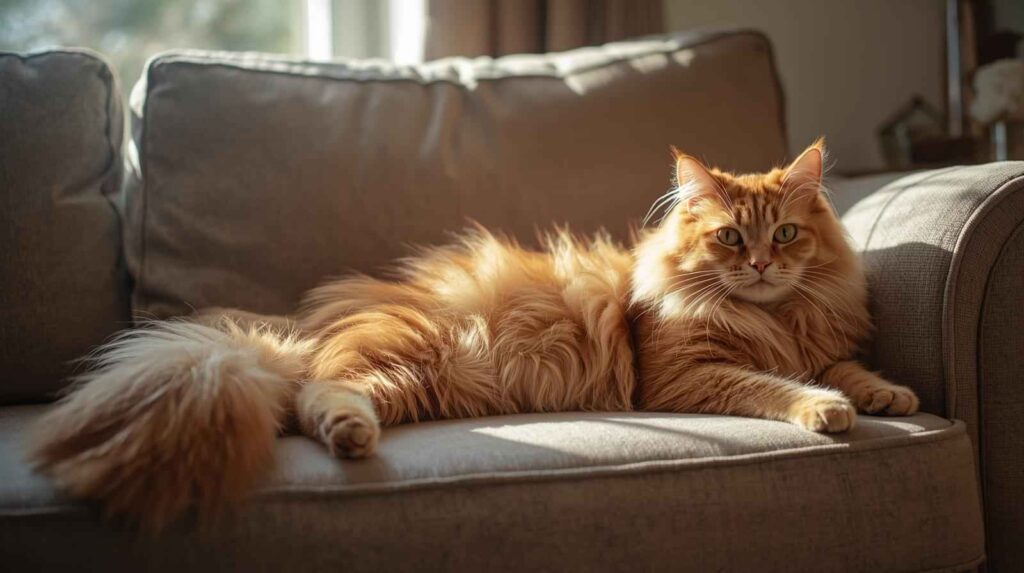
Maine coon cat exhibits the classic Maine coon temperament that has made the breed so beloved. These gentle giants are known for their dog-like personalities, often following their owners around the house and engaging in interactive play. The orange Maine coon cat typically displays high intelligence, making them excellent candidates for training and interactive games.
Many owners report that their Maine coon cat demonstrates exceptional social skills, getting along well with children, other cats, and even dogs. The breed’s natural curiosity and playful nature make an Maine coon cat an engaging companion that thrives on interaction and mental stimulation.
Health Statistics and Lifespan
Understanding the health profile of an Maine coon cat is crucial for potential owners. The typical Maine coon lifespan is around 13 years, though some sources suggest a broader range. On average, Maine coon cats live between 12 to 15 years, with some living longer with proper care.
Maine coon cat faces the same health challenges as other Maine coon color variations. Studies show that hypertrophic cardiomyopathy (HCM) prevalence is 10.1% in Maine coons, making regular cardiac screening essential for your orange Maine coon cat.
Common Health Concerns
- Hypertrophic Cardiomyopathy (HCM): Heart muscle thickening
- Spinal Muscular Atrophy (SMA): Genetic neuromuscular disorder
- Polycystic Kidney Disease (PKD): Inherited kidney condition
- Hip Dysplasia: Joint malformation
Grooming and Care Requirements
Maine coon cat requires dedicated grooming due to its luxurious double coat. Regular brushing sessions, ideally 2-3 times per week, help prevent matting and reduce shedding. During seasonal coat changes, your Maine coon cat may require daily brushing to manage the increased hair loss.
The distinctive orange coloration of your Maine coon cat can fade with excessive sun exposure, so indoor living or supervised outdoor time helps maintain the vibrant coat color. Professional grooming every 6-8 weeks can help keep your orange Maine coon cat looking its absolute best.
Feeding and Nutrition Guidelines
Proper nutrition is essential for maintaining the health and vibrant coat of your Maine coon cat. Due to their large size and extended growth period, Maine coon cats require high-quality protein sources and carefully monitored caloric intake to prevent obesity while supporting healthy development.
A mature Maine coon cat typically requires 400-600 calories daily, depending on activity level and individual metabolism. Many veterinarians recommend feeding multiple smaller meals throughout the day rather than one large meal, which can help prevent digestive issues common in large breed cats.
Finding an Orange Maine Coon Cat
Locating a reputable breeder for your Maine coon cat requires careful research. Due to the genetic rarity of female orange Maine coons, expect to pay premium prices, particularly for breeding-quality females. Male orange Maine coon cats are more readily available but still command higher prices than some other color variations.
When selecting your orange Maine coon cat, ensure the breeder provides health certificates and genetic testing results. All Maine coon cats registered from June 2024 must be tested for HCM, SMA, and PK-def, making genetic health screening standard practice among reputable breeders.
Training Your Orange Maine Coon Cat
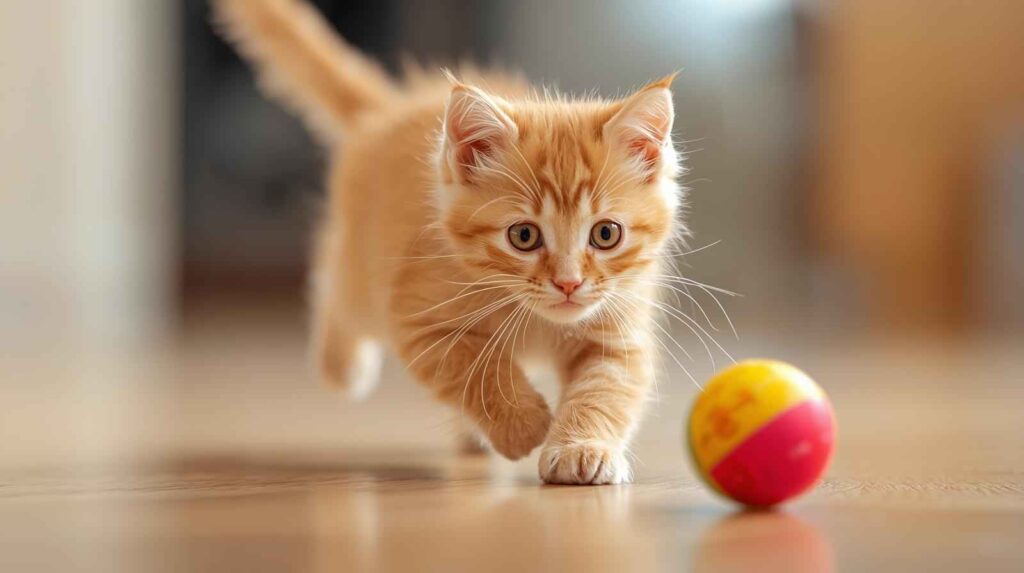
The intelligent nature of an Maine coon cat makes training both enjoyable and rewarding. These cats excel at learning tricks, responding to their names, and even walking on leashes. Many orange Maine coon cat owners successfully teach their pets to fetch, sit, and perform various commands.
Consistency and positive reinforcement work best when training your Maine coon cat. Their eager-to-please nature and food motivation make them excellent students for both basic obedience and more complex behaviors.
Living Environment Considerations
The orange Maine coon cat adapts well to various living situations but thrives in environments that provide adequate space for exercise and exploration. Their large size means they need room to stretch and play, making cramped apartments less suitable for these magnificent cats.
Many Maine coon cat owners find that providing tall cat trees, multiple scratching posts, and interactive toys helps satisfy their pet’s natural instincts. The breed’s love of heights means your orange Maine coon cat will appreciate elevated perches throughout your home.
Social Interaction and Compatibility
The orange Maine coon cat excels in multi-pet households due to their naturally social disposition. These cats typically integrate well with other felines and often form strong bonds with canine companions. The gentle nature of an orange Maine coon cat makes them excellent choices for families with children.
However, proper introductions remain important when bringing an Maine coon cat into a home with existing pets. Their large size can be intimidating to smaller animals, so gradual introductions help ensure harmonious relationships develop.
Seasonal Care for Orange Maine Coon Cats
The orange Maine coon cat requires adjusted care routines throughout the year. During winter months, their thick coat provides excellent insulation, but indoor heating can cause skin dryness. Summer care for your orange Maine coon cat should focus on preventing overheating and maintaining coat condition despite increased shedding.
Regular brushing becomes even more critical during seasonal transitions when your orange Maine coon cat sheds their undercoat. Professional groomers often recommend de-shedding treatments during peak shedding seasons to help manage the increased hair volume.
Exercise and Activity Needs
Despite their laid-back reputation, Maine coon cat requires regular exercise to maintain optimal health. Interactive play sessions, puzzle feeders, and climbing opportunities help satisfy their physical and mental stimulation needs. Many orange Maine coon cat owners find that their pets enjoy water play, a trait common throughout the breed.
Swimming or water-based play can provide excellent low-impact exercise for your orange Maine coon cat, particularly beneficial for older cats or those with joint issues. This unusual feline trait often surprises new owners but aligns with the breed’s historical development near water.
Cost Considerations
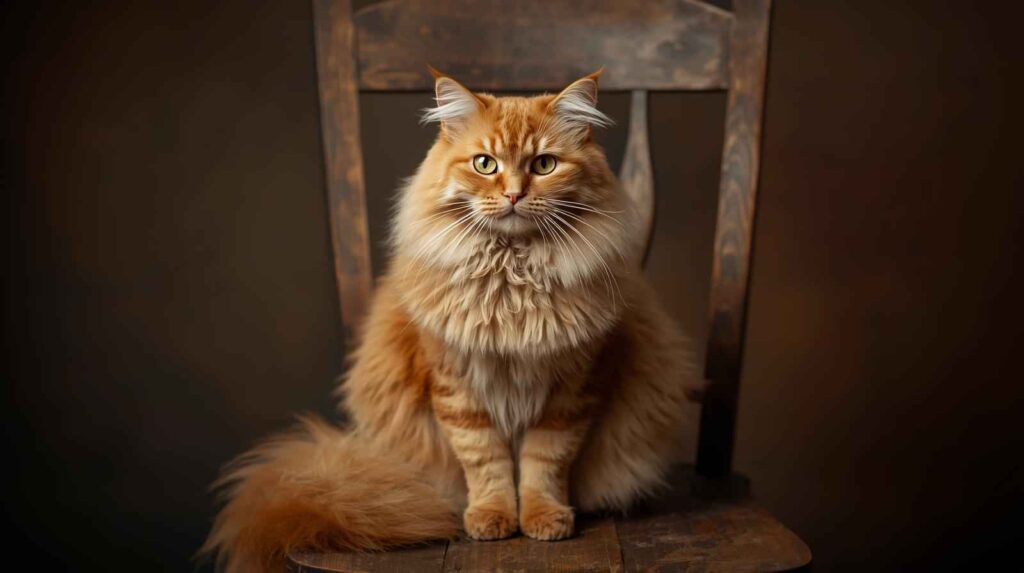
Owning an Maine coon cat represents a significant financial commitment extending beyond the initial purchase price. Veterinary care, high-quality food, grooming supplies, and potential health issues contribute to the lifetime cost of your orange Maine coon cat ownership.
Budget considerations should include regular preventive veterinary care, quality nutrition appropriate for large breed cats, professional grooming expenses, and potential emergency medical costs. Many Maine coon cat owners find pet insurance valuable given the breed’s predisposition to certain health conditions.
Breeding Considerations
For those interested in breeding their orange Maine coon cat, understanding the genetic implications becomes crucial. The sex-linked nature of orange coloration affects breeding outcomes and requires careful planning to achieve desired results. Female orange Maine coon cats are particularly valuable for breeding programs due to their rarity.
Responsible breeding of orange Maine coon cats requires comprehensive health testing, genetic counseling, and adherence to breed standards. Many successful breeders recommend working with experienced mentors when beginning an orange Maine coon cat breeding program.
As you can see from our Maine coon Guides, proper research and preparation are essential when welcoming any pet into your family. The Maine coon cat makes an exceptional companion for those prepared to meet their unique needs and provide appropriate care throughout their lifetime.
Conclusion
Maine coon cat represents one of the most spectacular color variations of America’s largest domestic cat breed. From their impressive size statistics to their gentle, dog-like personalities, these magnificent felines offer companionship that few other breeds can match. While the genetic rarity of females makes them more expensive, both male and female orange Maine coon cats bring years of joy and unconditional love to their families.
Understanding the specific care requirements, health considerations, and unique characteristics of the orange Maine coon cat helps ensure a successful and rewarding relationship with these gentle giants. Their intelligence, social nature, and stunning appearance combine to create a truly exceptional feline companion that will enrich your life for many years to come.
Whether you’re drawn to their magnificent orange coats, impressive size, or legendary gentle temperament, the Maine coon cat offers everything you could want in a feline companion. With proper care, nutrition, and veterinary attention, your orange Maine coon cat will thrive and provide countless memories of unconditional love and companionship.
Are you ready to welcome the magnificent presence of an orange Maine coon cat into your home and heart?
